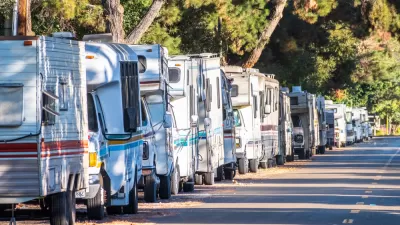The SFPark two-year pilot has concluded, and the city recently released comprehensive data that make a good case for its success in almost every possible metric of parking management. Now can the city expand the program?
"SFpark has released new comprehensive stats collected during its two-year pilot program phase, documenting the numerous benefits that it garnered just by pricing parking according to demand," reports Aaron Bialick.
The report delivers positive findings about the impact of the system: "In the areas where SFpark was tested — Civic Center, the Embarcadero, Downtown, the Mission, the Fillmore, the Marina, and Fisherman’s Wharf – the SFMTA found that SFpark resulted in cheaper parking prices overall, more readily available parking, many fewer parking citations, and much less time wasted by drivers circling around, looking for open parking spots." The article includes specific data backing up those claims.
Despite the program's successes, neighborhoods like Potrero Hill and Dogpatch have strongly opposed the implementation of the system. Bialick recommends one change in the program to perhaps preempt arguments that the system is a crass money grab on the part of Muni: although SFPark enacts many of Donald Shoup's recommendations on parking management, it has yet to implement the key practice of investing revenue generated by parking fees to local benefit districts. SFMTA’s current chief, Ed Reiskin, told Streetsblog that the transit agency will consider local investments, but that the agency would require a change in the City Charter to do so.
Now that the pilot has wrapped, what's next? "The SFMTA expects to propose a plan for SFpark’s expanded operation in the fall. For now, the SFpark phone app and in-ground parking sensors have been turned off, though the agency still monitors parking occupancy through meter payments."
FULL STORY: SFpark Releases Pilot Report, Considers Giving Revenue to Local Streets

Alabama: Trump Terminates Settlements for Black Communities Harmed By Raw Sewage
Trump deemed the landmark civil rights agreement “illegal DEI and environmental justice policy.”

Study: Maui’s Plan to Convert Vacation Rentals to Long-Term Housing Could Cause Nearly $1 Billion Economic Loss
The plan would reduce visitor accommodation by 25% resulting in 1,900 jobs lost.

Planetizen Federal Action Tracker
A weekly monitor of how Trump’s orders and actions are impacting planners and planning in America.

Federal Homelessness Agency Places Entire Staff on Leave
The U.S. Interagency Council on Homelessness is the only federal agency dedicated to preventing and ending homelessness.

Restoring Northern India’s Himalayan ‘Water Temples’
Thousands of centuries-old buildings protect the region’s natural springs and serve as community wells and gathering places.

Milwaukee to Double Bike Share Stations
Bublr Bikes, one of the nation’s most successful, will add 500 new e-bikes to its system.
Urban Design for Planners 1: Software Tools
This six-course series explores essential urban design concepts using open source software and equips planners with the tools they need to participate fully in the urban design process.
Planning for Universal Design
Learn the tools for implementing Universal Design in planning regulations.
Caltrans
Smith Gee Studio
Institute for Housing and Urban Development Studies (IHS)
City of Grandview
Harvard GSD Executive Education
Toledo-Lucas County Plan Commissions
Salt Lake City
NYU Wagner Graduate School of Public Service




























